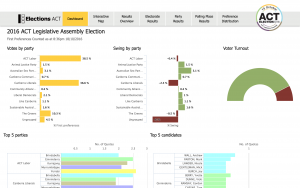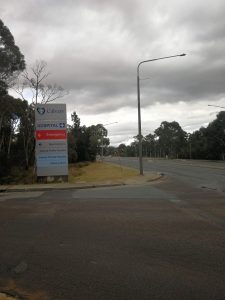ACT and the ‘Insulation Effect’
It has been a tumultuous year in Western politics, with many political scientists and journalists struggling to explain exactly how the supposedly inconceivable occurred. The monumental Brexit decision stunned many casual observers of a truly nasty campaign. Simultaneously, the rapid rise of Donald Trump from mediocre businessman to Republican Presidential Nominee horrified many.
So, how does one explain the ‘sudden’ global backlash against established politicians and long standing global ties, and how does the ACT fit into the global political movement?

Dr. Brendan McCaffrie, senior Research Fellow at the University of Canberra Institute of Governance and Policy Analysis, says that part of the reasons, particularly in America and the United Kingdom, may be due to rising issues of globalisation and immigration, where a lot of people “feel left out of the current system” and find that the traditional parties are no longer representing the issues they are concerned with.
Speaking on Australia, Dr. McCaffrie credits the changing nature of Australian politics with the increasingly complex social system that has arisen. Where you might have found traditional pockets of union members, the political demographic has since changed over time.
“Neither [party] has adapted really well, I think is fair to say, but I think it’s really hard for the party model to adapt, so it’s not just an issue if whether the parties have done a good job of speaking to this more diverse electorate, it’s whether the party model is a good one to speaking to such a diverse electorate”.
In reaction to a changing electorate, the rise of minor parties with more diverse special interests are gaining traction, the rise of the Greens are a classic example. Another factor to have hit certain parts of Australia is the changing nature of economic and job stability. Where South Australia and Western Australia previously had security through car manufacturing, or the mining industry, recent years have shown a growth slow, and even complete closure of factories.
Touching on South Australia, there was a clear representation of voter dissent with the major parties based on the 2016 Federal election results. The impending closure of car manufacturing within the state and the apparent lack of a clear contingency plan saw a dramatic swing away from the Coalition, and a surge towards the Nick Zenophon Team. Fear of job instability, and the loss of a major revenue stream to South Australia, has apparently turned voters to new parties who promise to do better for them.
Comparing the current situation with the Republican Party and how it has essentially been taken over by a complete outsider, with a growing dissatisfaction with the two major party options within Australia, Dr. McCaffrie expresses his disbelief that such a situation as Trump could occur within the Australian political system.
The Australian voting system, with its preferential voting, “doesn’t allow an outsider to take over the major parties so easily”, so it is unlikely we shall be seeing any of the same level of political drama within our own political system.
However, even though there are not the same reasons for anger in the ACT with Canberrans enjoying a higher median income level, high levels of employment and education, there is still a feeling of distrust and dissatisfaction with the current political system, often stemming from a sense of a lack of discourse with politicians.

Tim Friel, Like Canberra candidate for Brindabella, believes that politics should be brought back to the people, in order to “bring back the ACT people back into some of our decisions”. There is a clear emphasis of non-career politics in order to bring “real life back into the politics”.
“Our policies come from Facebook discussions, emails between people that are more conservative, more liberal, to develop our well-rounded policies, to bring some fresh ideas to the space”.

Tim talks about his time on the campaign trail, where they gained interest from people on the street once they revealed they weren’t one of the major political parties, and they could bring something new within the political spectrum within the ACT.
Like Canberra believe that Canberrans don’t trust our politicians, as Tim explains, “that’s the word on the street” and that people were looking for someone new to vote for after apparent disappointment and “stagnation of some of the [ACT Legislative Assembly] members”.
Interesting survey: Barr is second worst ACT chief minister of all time https://t.co/oTf5F1VZel
— Paul Osborne AAP (@osbornep) October 14, 2016

Still, the ACT still appears to be widely protected from the wider growing dissent if we are to take the October 16 Election results at face value. With only a 0.4% swing away from the ACT Labour party, and a 2.3% swing away from the Canberra Liberals, there was minimal ‘dissent’ from the traditional voting norm within the ACT.
The fact remains that even if Canberrans talk about the global voting trends, and wider national dissatisfaction with the Australian Labour and the Coalition parties, the ACT remains in a fairly comfortable and stable position, with many of the wider economic issue yet to affect the nations capital. Canberra certainly isn’t about the lose their main source of manufacturing income, it’s never been a manufacturers stronghold. We don’t rely on lucrative Defence contracts, there’s certainly no room to build the new Submarine fleet within Lake Burley Griffin, and according to the Australian Bureau of Statistic’s 2016 data collection, the ACT boasts a much higher median income level than the national average.
While many other regions in Australia are facing economic uncertainty, which will naturally factor in to how individuals vote, the ACT has proven to be largely isolated from many issues which could explain changing voter trends elsewhere within the world. While we may hear of people talking of job losses because of the downturn of the mining industry, we don’t actually experience the effects. Canberrans hear all the nations woes, yet the distrust and dissent experienced elsewhere does not directly transpose into our voting habits.
Full interview with Dr. Brendan McCaffrie with Kristina Shaw. Relevant audio from 0:00-23:30



Be the first to comment!